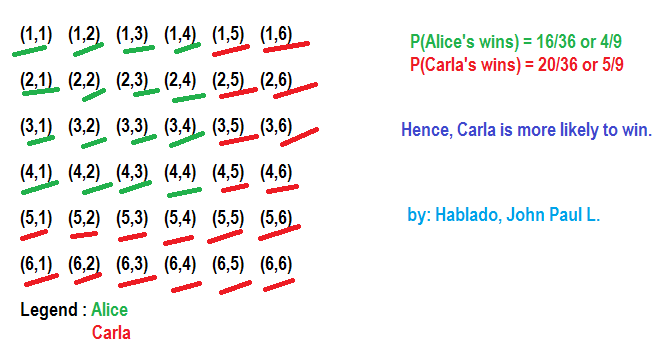High Roller
 Alice and Carla are playing a dice game. Here's how it works:
Alice and Carla are playing a dice game. Here's how it works:
- Each person rolls a die, and the highest number rolled of the two is recorded.
- If the highest number rolled is a 1, 2, 3 or 4, Alice wins.
- If the highest number rolled is a 5 or a 6, Carla wins.
On average, who is more likely to win: Alice, Carla, or are the probabilities equal?
This section requires Javascript.
You are seeing this because something didn't load right. We suggest you, (a) try
refreshing the page, (b) enabling javascript if it is disabled on your browser and,
finally, (c)
loading the
non-javascript version of this page
. We're sorry about the hassle.
6 solutions
In order for Alice to win, both players must roll a number that is not larger than 4 . The probability that Alice rolls a number less than 4 is 3 2 ; for Carla, this number is the same. Thus, since both events are independent, the probability that Alice will win the game is 3 2 ∗ 3 2 , which equals 9 4 . Thus, the probability that Carla will win is 1 − 9 4 = 9 5 , and thus she is more likely to win.
X ~ the number rolled
P(X=5)+P(X=6)
=1/6 + 1/6
=1/3
Let A = event where both Carla and Alice roll a 5 or 6
B= event where Carla rolls a 5 or 6 while Alice rolls a 1,2,3 or 4
C= event where Alice rolls a 5 or 6 while Carla rolls a 1,2,3 or 4.
P(A) =1/3 x 1/3 = 1/9
P(B) = 1/3 x 2/3= 2/9
P(C) = 1/3 x 2/3= 2/9
Therefore, the probability that Carla wins is
P(A)+P(B)+P(C)
= 1/9 + 2/9 + 2/9
= 5/9
Since 5/9 > 0.50, their probabilities are not equal and Carla is more likely to win.
Moderator note:
A slightly easier approach would be to calculate that the probability that Alice wins, because it's just the case of "Both Alice and Carla roll 1, 2, 3 or 4".
Carla will win
The odds of either die being 4 or less is 2/3. The odds of both being 4 or less (and therefore the odds of Alice winning) is (2/3)^2, or 4/9.
This makes Carla's odds of winning 1-(4/9) or 5/9.
Carla is more likely to win.
Forget The Formulas, it's just common sense that 2 numbers has better odds than 4 numbers , just like when you play Keno .

Look at the table of values for the values produced by two dies when rolled independantly of the other. 36 values are produced.
table of values for two die
You find that 20 times 5,6 dominate the values. However only 16 times does 1,2,3 or 4 will dominate.
Thus Carla wins!